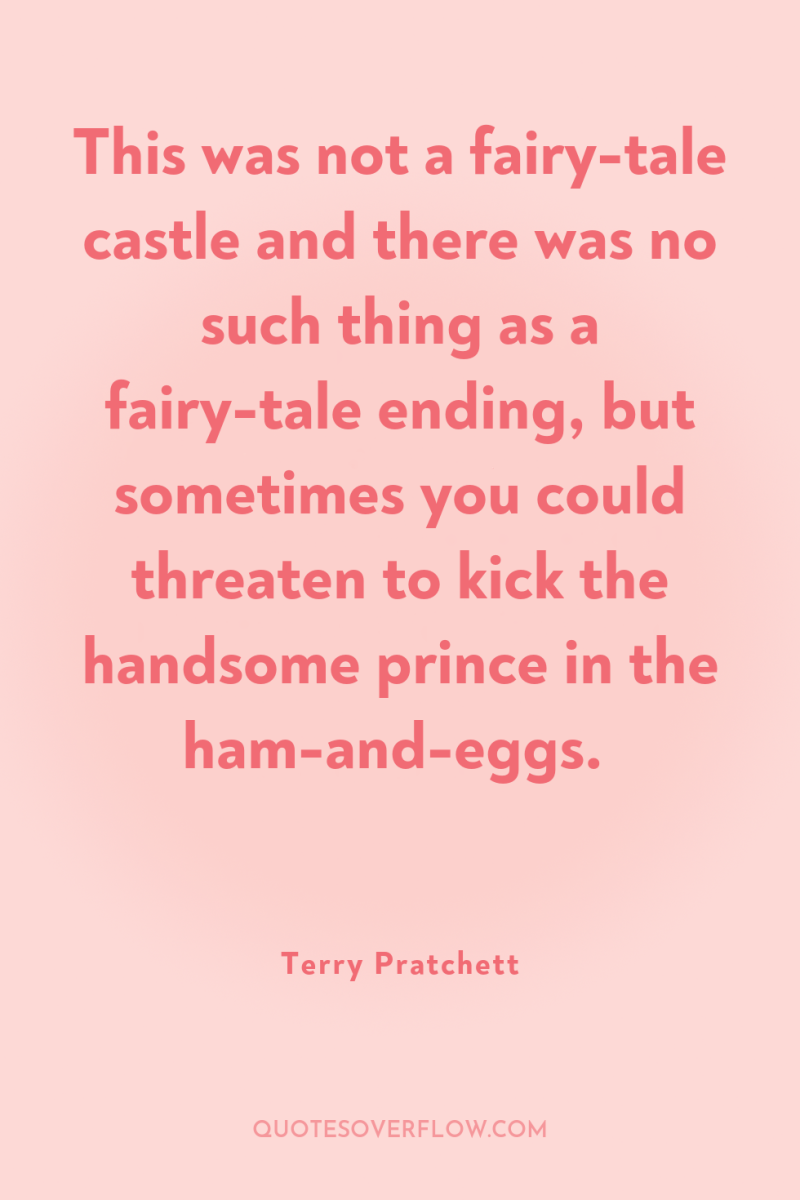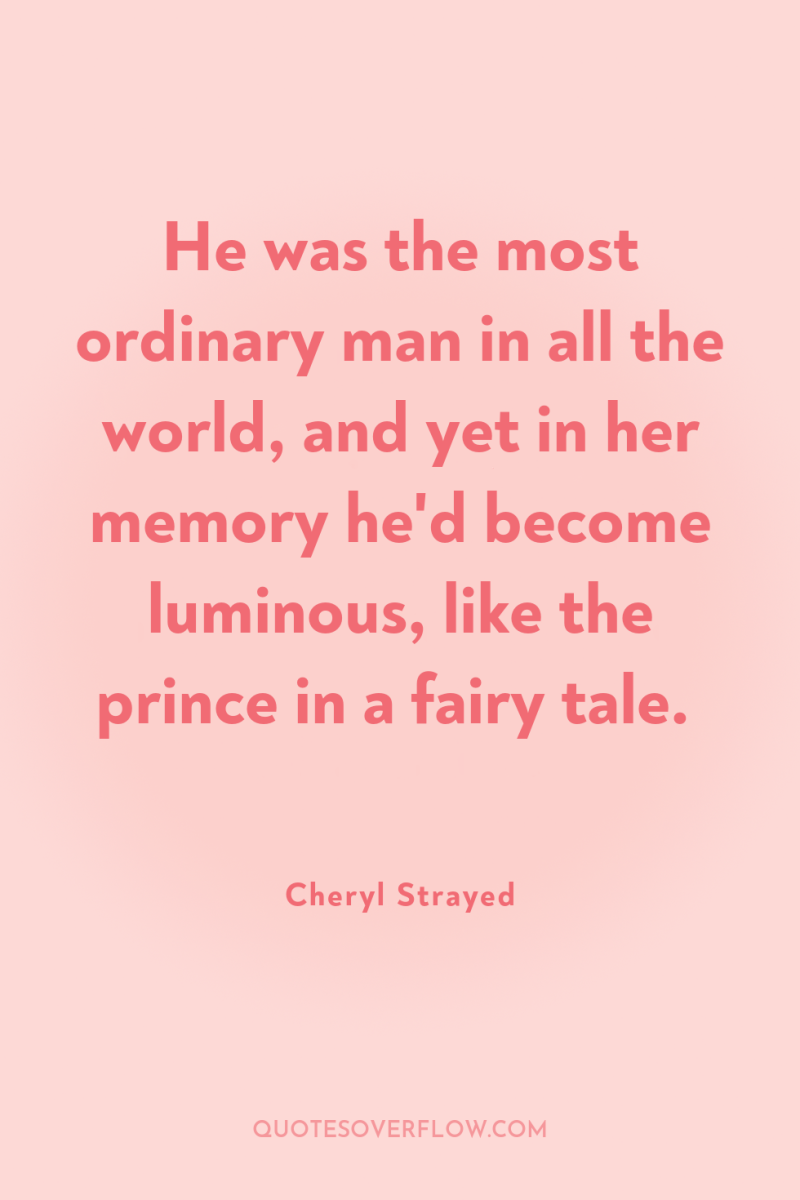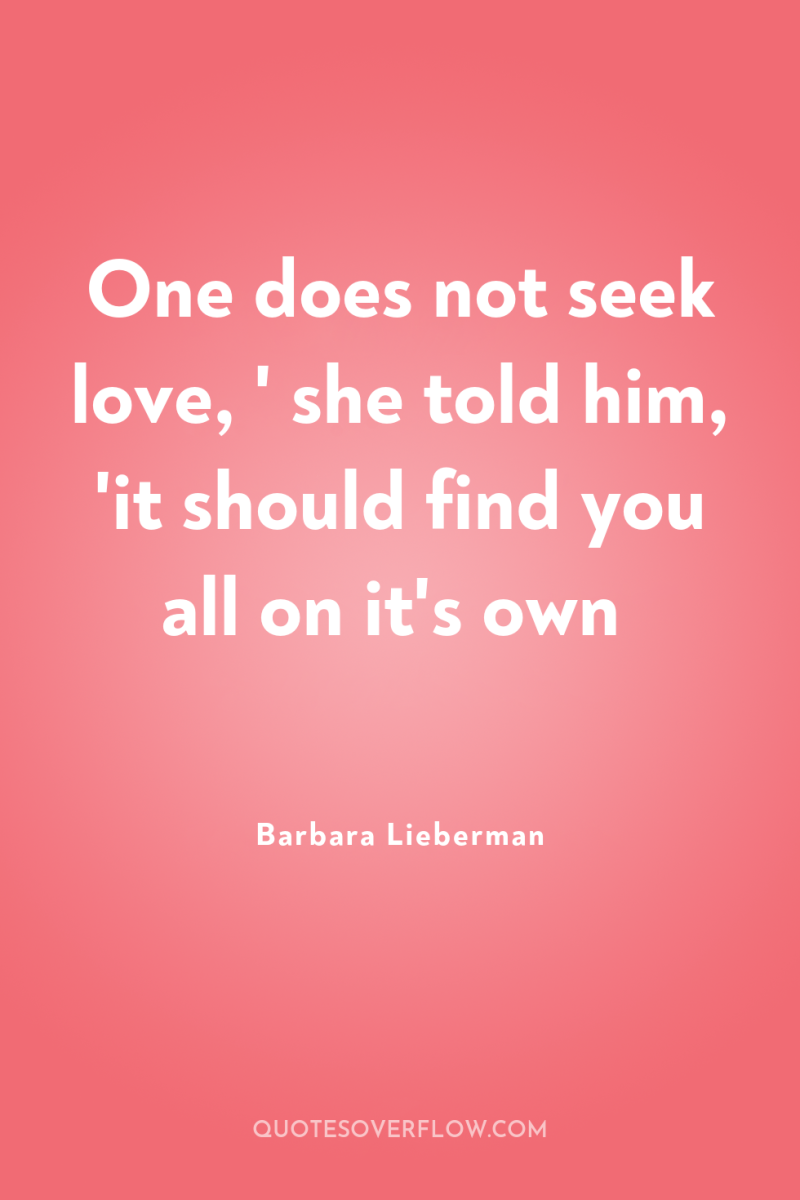1
They kissed for the first time then in the cold spring rain, though neither one of them now knew that it was raining. Tristran's heart pounded in his chest as if it was not big enough to contain all the joy that it held. He opened his eyes as he kissed the star. Her sky-blue eyes stared back into his, and in her eyes he could see no parting from her.Neil Gaiman
2
You think fairy tales are only for girls? Here’s a hint–ask yourself who wrote them. I assure you, it wasn’t just the women. It’s the great male fantasy–all it takes is one dance to know that she’s the one. All it takes is the sound of her song from the tower, or a look at her sleeping face. And right away you know–this is the girl in your head, sleeping or dancing or singing in front of you. Yes, girls want their princes, but boys want their princesses just as much. And they don’t want a very long courtship. They want to know immediately.Rachel Cohn

3
This was not a fairy-tale castle and there was no such thing as a fairy-tale ending, but sometimes you could threaten to kick the handsome prince in the ham-and-eggs.Terry Pratchett
4
Some seasons later, the Princess of the kingdom was riding with her handmaiden on the edge of the dark woods. Though once she had been very ill, the Princess had recovered miraculously and was now married to a fine prince. She lived a full and happy life: walked and danced and sang, and enjoyed all the vast riches of health. They had a dear baby girl who was much loved and ate pure honey and drank the dew from rose petals and had beautiful butterflies for playthings. .Kate Morton

5
He was the most ordinary man in all the world, and yet in her memory he'd become luminous, like the prince in a fairy tale.Cheryl Strayed

6
Soul bonds can't be broken. They only bend for a while .. .Diane J. Reed
7
Did I ever tell you the difference between a Northern fairy tale and a Southern one?" she asked him, indulging herself and letting her head rest on his shoulder. God, he felt good. Her man. Where her head was meant to lie, right there, on him. "What's the difference?"" A Northern one starts 'once upon a time, ' while a Southern one starts 'y'all ain't going to believe this shit.Erin McCarthy

8
One does not seek love, ' she told him, 'it should find you all on it's ownBarbara Lieberman
9
Theories about world literature, of which fairy tale is a fundamental part, emphasize the porousness of borders, geographical and inguistic: no frontiercan keep a good story from roaming. It will travel, and travel far, and travel back again in a different guise, a changed mood, and, above all, a new meaning.Marina Warner
10
If you only think of yourself, there's no room for another in marriage.Barbara Lieberman
11
The sound of the pages turning was the sound of magic. The dry liquid feel of paper under fingertips was what magic felt like.Emma Donoghue
12
The well-intentioned mothers who don't want their children polluted by fairy tales would not only deny them their childhood, with its high creativity, but they would have them conform to the secular world, with its dirty devices. The world of fairy tale, fantasy, myth, is inimical to the secular world, and in total opposition to it, for it is interested not in limited laboratory proofs but in truth.Madeleine LEngle
13
The End" is just the beginning.Kelsey Macke
14
Once upon a time, is how stories begin...NZuri Za Austin
15
Once upon a time, he might’ve chased her and tumbled her in the sheets with the promise of more in the future.Katherine McIntyre
16
You want to know how to stop this killer? Forgive yourself, and he’lldisappear from your life forever.”“ Thanks. I’ll be sure to do that.” And I know:1. This is almost the same conversation I’ve had with myself many timesbefore.2. Gordon’s only trying to help. But it doesn’t matter. I:1. Say, “See you later.”2. Step outside.3. Close the door. I don’t want to, really. I want to go back inside and believe Gordon’s words, like a child believing in a fairy tale, and I want to escape this nightmare forever. But I can’t. I realize now that it’s easy to tell the difference between a real problem andan imaginary one. It’s just the terror of facing the truth that’s hard.Jeremy C. Shipp
17
- You may always talk to me, honey... - Started suddenly bright white moon. - The stars are too young to give you a wise advice, yet.Galina Nelson
18
Without your own inner beast tamed ye can never tame the wild ones around ye!Jennifer Silverwood
19
Everyone knew you shouldn't go biting into fruit offered to you by magical creatures in the woods, even if you'd thought until just five minutes ago that such stories were, you know, only stories.Molly Ringle
20
Magic isn’t something that can be explained: it simply is. It takes while it gives. So” — the spinner steps closer, his outstretched hand demanding — “I have given you magic, and now it must be paid.Tabi Card
21
Who am I kidding? This isn’t a fairy tale. It’s my life.Zoe Cruz
22
The truth is that Trout, like Vonnegut and Ray Bradbury and many others, writes parables. These are set in frames which have become called, for no good reason, science fiction. A better generic term would be 'future fairy tales'. And even this is objectionable, since many science fiction stories take place in the present or the past, far and near.Unknown
23
And everyone lived happily, thought maybe not completely honestly, ever after. The End.Jon Scieszka
24
I found the kingdom of far far away, prince charming would not be so far.Arzum Uzun
25
She is a figure of legend and fairy tale, one to be taken seriously, or she might knock you off your feet with a quick whirl of the staff she carries everywhere.Claire Wong
26
You think her innocent/ Your little lost girl/ Caped in Inquisition red/ Yet when she leads you hunting Hyde/ Mind don't slay Jekyll in his steadShannon Barnsley
27
Home is a fairy tale, the kind where children are lost in the woods, found, cooked and eaten.Jamie Ford
28
He’s jealous because lions are better hunters.”-- Monroe “Are you compensating for something, Monroe?” --BastianBethany Averie
29
Winter passed, and the world around began to wake. The birds returned to the kingdom and set about readying their nests, deer could be seen once more grazing where the fields met the woods, and buds burst forth upon the branches of the kingdom's trees.Kate Morton
30
We build our understanding of the emotional world through the myths and legends of our culture. We are all, in part, made of fairy tales.Will Storr
31
I am a lover of love and I am a lover of words, and the two together spin visions of airy castles, but also may pierce the heart of hope. And so I remind you that I am a fool, a poet, and what matters is reality, not lovely words. Words are full of promise, yet empty of matter.Waylon H. Lewis
32
I'm a romantic and I kinda believed in this fairy tale. And in some ways I think that's always been to my advantage, because like if you can believe in something great, I feel like you can achieve something great.Katy Perry
33
Perhaps the only happily ever after is to survive to tell the storyKat Howard
34
His princess was dusty.Sarah E. Morin
35
All through the winter months, Rose kept up the practice of sitting by the fire with Peter and a book telling him stories. The doctor stopped to listen one afternoon out of curiosity, and heard her say, “…then the Mermaid said to the Pirate, ‘I would rather perish with the boy than go with you.’ And the Pirate said, ‘So be it, ’ and sealed them both up inside the treasure chest. Then the pirate’s crew got together to lift the chest up, and with a nod from their captain, they cast the chest overboard into the sea. The chest was so heavy, it sank in the water in spite of the air inside, and in seconds it was gone from view, disappearing into the deep blue depths. If the boy and the mermaid were unable to free themselves, they would surely perish.” Peter’s eyes were wide with interest. “But- I can’t tell you what happened- you’ll have to find out next time.” She stopped and closed the book. Peter shook his head and put his hand on the book. She laughed and said, “You want to hear more now, do you? .Christopher Daniel Mechling
36
It was not until much later when, after a deep and satisfying orgasm, I suddenly realised the true meaning of the fairy tale and the nature of the magic kiss of which it speaks.Germaine Greer
37
Since these wonder tales have been with us for thousands of years and have undergone so many different changes in the oral tradition, it is difficult to determine the ideological intention of the narrator, and when we disregard the narrator's intention, it is often difficult to reconstruct (and/or deconstruct) the ideological meaning of a tale. In the last analysis, even if we cannot establish whether a wonder tale is ideologically conservative, sexist, progressive, emancipatory, etc., it is the celebration of wonder that constitutes its major appeal. No matter what the plot may be, this type of tale calls forth our capacity as readers and potential transmitters of its signs and meanings to wonder. We do not want to know the exact resolution, the "happily ever after, " of a tale - that is, what it is actually like. We do not want to name God, gods, goddesses, or fairies, who will forever remain mysterious and omnipotent. We do not want to form graven images. We do not want utopia designated for us. We want to remain curious, startled, provoked, mystified, and uplifted. We want to glare, gaze, gawk, behold, and stare. We want to be given opportunities to change, and ultimately we want to be told that we can become kings and queens, or lords of our own destinies. We remember wonder tales and fairy tales to keep our sense of wonderment alive and to nurture our hope that we can seize possibilities and opportunities to transform ourselves and our worlds.Jack D. Zipes
38
He turns the key. Presto! It opens this book of odd taleswhich transform the Brothers Grimm.Transform?As if an enlarged paper clipcould be a piece of sculpture.( And it could.)Anne Sexton
39
Now that I think about it, this might all have been inevitable. The reason we all ended up here, the reason I couldn't leave her alone...it all had to be a ridiculous fairy tale.Jun Mochizuki
40
Are ya trying' to kill me, lass?" " Kill you? No." Maggie leaned closer, her hands drifting up and cradling his face as she rolled her hips again in one wicked pass. "Torture you? Maybe.Sara Humphreys
41
I'll not be lyin' if I tell ya that I fancy ya a bit myself." " The fancy feelings are mutual." A grin curved her lips right before Declan pressed a kiss to them.Sara Humphreys
42
Me father always said if ya can find a lass who's brilliant in the kitchen and in the bed ya best not let her go.Sara Humphreys
43
Are ya tryin' to kill me, Maggie?" Declan bit the words out and his fingers dug deeper into her hips. "Are ya wantin' to see a grown man beg?Sara Humphreys
44
They [Fairy Tales] are talking about real emotions, telling true stories, through the medium of metaphor. People used to understand metaphor better than I think we do now. But these stories are so potent, they refuse to die.Jane Yolen
45
And then they lived happily, and we who hear the story are happier still.Andrew Lang
46
And the old woman who had been the prince’s nurse became nurse to the prince’s children – at least she was called so; though she was far too old to do anything for them but love them. Yet she still thought that she was useful, and knew that she was happy. And happy, indeed, were the prince and princess, who in due time became king and queen, and lived and ruled long and prosperously.Andrew Lang
47
The literary fairy tale became an acceptable social symbolic form through which conventionalized motifs, characters, and plots were selected, composed, arranged, and rearranged to comment on the civilizing process and to keep alive the possibility of miraculous change and a sense of wonderment.Jack D. Zipes
48
As the literary fairy tale spread in France to every age group and every social class, it began to serve different functions, depending on the writer's interests. It represented the glory and ideology of the French aristocracy. It provided a symbolic critique, with utopian connotations, of the aristocratic hierarchy, largely within the aristocracy itself and from the female viewpoint. It introduced the norms and values of the bourgeois civilizing process as more reasonable and egalitarian than the feudal code. As a divertissement for the aristocracy and bourgeoisie, the fairy tale diverted the attention of listeners/readers from the serious sociopolitical problems of the times, compensating for the deprivations that the upper classes perceived themselves to be suffering. There was also an element of self-parody, revealing the ridiculous notions in previous fairy tales and representing another aspect of court society to itself; such parodies can be seen in Jacques Cazotte's "A Thousand and One Follies" (1746), Jean-Jacques Rousseau's "The Queen Fantasque" (1758), and Voltaire's "The White Bull" (1774). Finally, fairy tales with clear didactic and moral lessons were approved as reading matter to serve as a subtle, more pleasurable means of initiating children into the class rituals and customs that reinforced the status quo. .Jack D. Zipes
49
It was only as part of the civilizing process that storytelling developed within the aristocratic and bourgeois homes, in the seventeenth and eighteenth centuries through governesses and nannies, and later in the eighteenth and the nineteenth centuries through mothers, who told bedtime stories.Jack D. Zipes
50
The very name of the genre itself - fairy tale - originated during this time, for the French writers coined the term conte de fee during the seventeenth century, and it has stuck to the genre in Europe and North America ever since. This "imprint" is important, because it reveals something crucial about the fairy tale that has remained part of its nature to the present. The early writers of fairy tales placed the power of metamorphosis in the hands of women - the redoubtable fairies. In addition, this miraculous power was not associated with a particular religion or mythology, through which the world was to be explained. It was a secular mysterious power of compassion that could not be explained, and it derived from the creative imagination of the writer. Anyone could call upon the fairies for help, and it is clear that the gifted French women writers of the seventeenth century preferred to address themselves to a fairy and to have a fairy resolve the conflicts in their tales rather than the Church, with its male-dominated hierarchy. After all, it was the Church that had eliminated hundreds of thousands of so-called female witches during the previous two centuries in an effort to curb heretical and nonconformist beliefs. However, those "pagan" notions survived in the tradition of the oral wonder tale and surfaced in published form in France when it became safer to introduce in a symbolical code supernatural powers and creatures other than those officially sanctioned by the Christian code. In short, there was something subversive about the institutionalization of the fairy tale in France during the 1690S, for it enabled writers to create a dialogue about norms, manners, and power that evaded court censorship and freed the fantasy of the writers and readers, while at the same time paying tribute to the French code of civilite and the majesty of the aristocracy. Once certain discursive paradigms and conventions were established, a writer could demonstrate his or her "genius" by rearranging, expanding, deepening, and playing with the known functions of a genre that, by 1715, had already formed a type of canon, which consisted not only of the great classical tales-" Cinderella, " "Sleeping Beauty, " "Rapunzel, " "Rumpelstiltskin, " "Puss in Boots, " "Little Red Riding Hood, " "Beauty and the Beast, " "Blue beard, " "The Golden Dwarf, " "The Blue Bird, " and "The White Cat"-but also the mammoth collection The Arabian Nights. .Jack D. Zipes
51
Man, Grandma, what big hair you have."" The better to style with, my dear.Neal Shusterman
52
It's a never ending dream for everyone it seems, to find again what was once precious and has been lost.Carolyn Turgeon
53
Now it seemed unbelievable, the innocence of a girl in a fairy tale.Janet Fitch
54
Life itself is the most wonderful fairytale.Hans Christian Andersen